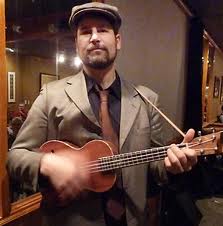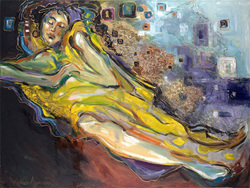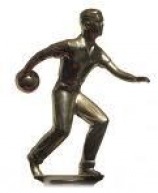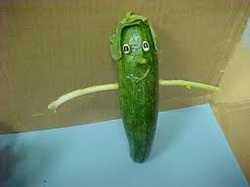
What little he decided to keep was lined up neatly in bags by the front door. Dad was running the vacuum cleaner around the upstairs rooms. I kept looking out the freshly polished windows.
Dad’s eyes were bloodshot. He blamed it all on the dust.
“It’s brought up a lot of stuff.” He said, pushing the vacuum cleaner faster around the old, now empty room.
The paint was darker in places. I could see where the bookshelf used to be. The sofa had left dents in the carpet too. Dad kept going over those bits with the vacuum cleaner, hoping it would suck the carpet back into its old shape.
“Just leave it Dad,” I said, “It’ll never be like it was.”
Dad kicked the vacuum cleaner off and pushed past me mumbling.
I followed him downstairs and into the kitchen. All the appliances were lined up against one wall. A coffee maker, toaster and blender sat on the floor like a breakfast-making production line. They used to sit that way on the side.
Dad pulled on a pair of rubber gloves, struggling to get his fingers all the way to the end. I leant against the doorframe and watched him scrub the sides with disinfectant. He held the bottle up to the light, read the label and then poured the emerald chemical neat, directly onto the sponge.
The smell was unbearable, abrasive, erasing.
“You could help.” Dad said like he used to when I was a kid.
“I can’t do that Dad.”
“Then you can go.” He said without looking up from the sponge.
“I can’t do that either.”
Dad sighed and stopped scrubbing. I thought I saw a tear well up in his eye. He’d blame it on the chemical if I mentioned it. I didn’t. I took in the moment, a silent testimonial and evidence to the fact that despite his behaviour, he wasn’t all right.
He knew that all the disinfectant in the house wouldn’t erase her from these walls.
Seeing that he knew, made me start to believe it too. I walked over to the sink and pulled on a pair of rubber gloves.
I stood next to my Dad. He looked at me, without saying anything, for what felt like an entire minute. It was as close to a hug as he could manage.
Dad pulled off one of the gloves and rubbed his eyes.
“God Damn chemicals.” He said.
Dad’s eyes were bloodshot. He blamed it all on the dust.
“It’s brought up a lot of stuff.” He said, pushing the vacuum cleaner faster around the old, now empty room.
The paint was darker in places. I could see where the bookshelf used to be. The sofa had left dents in the carpet too. Dad kept going over those bits with the vacuum cleaner, hoping it would suck the carpet back into its old shape.
“Just leave it Dad,” I said, “It’ll never be like it was.”
Dad kicked the vacuum cleaner off and pushed past me mumbling.
I followed him downstairs and into the kitchen. All the appliances were lined up against one wall. A coffee maker, toaster and blender sat on the floor like a breakfast-making production line. They used to sit that way on the side.
Dad pulled on a pair of rubber gloves, struggling to get his fingers all the way to the end. I leant against the doorframe and watched him scrub the sides with disinfectant. He held the bottle up to the light, read the label and then poured the emerald chemical neat, directly onto the sponge.
The smell was unbearable, abrasive, erasing.
“You could help.” Dad said like he used to when I was a kid.
“I can’t do that Dad.”
“Then you can go.” He said without looking up from the sponge.
“I can’t do that either.”
Dad sighed and stopped scrubbing. I thought I saw a tear well up in his eye. He’d blame it on the chemical if I mentioned it. I didn’t. I took in the moment, a silent testimonial and evidence to the fact that despite his behaviour, he wasn’t all right.
He knew that all the disinfectant in the house wouldn’t erase her from these walls.
Seeing that he knew, made me start to believe it too. I walked over to the sink and pulled on a pair of rubber gloves.
I stood next to my Dad. He looked at me, without saying anything, for what felt like an entire minute. It was as close to a hug as he could manage.
Dad pulled off one of the gloves and rubbed his eyes.
“God Damn chemicals.” He said.






 RSS Feed
RSS Feed